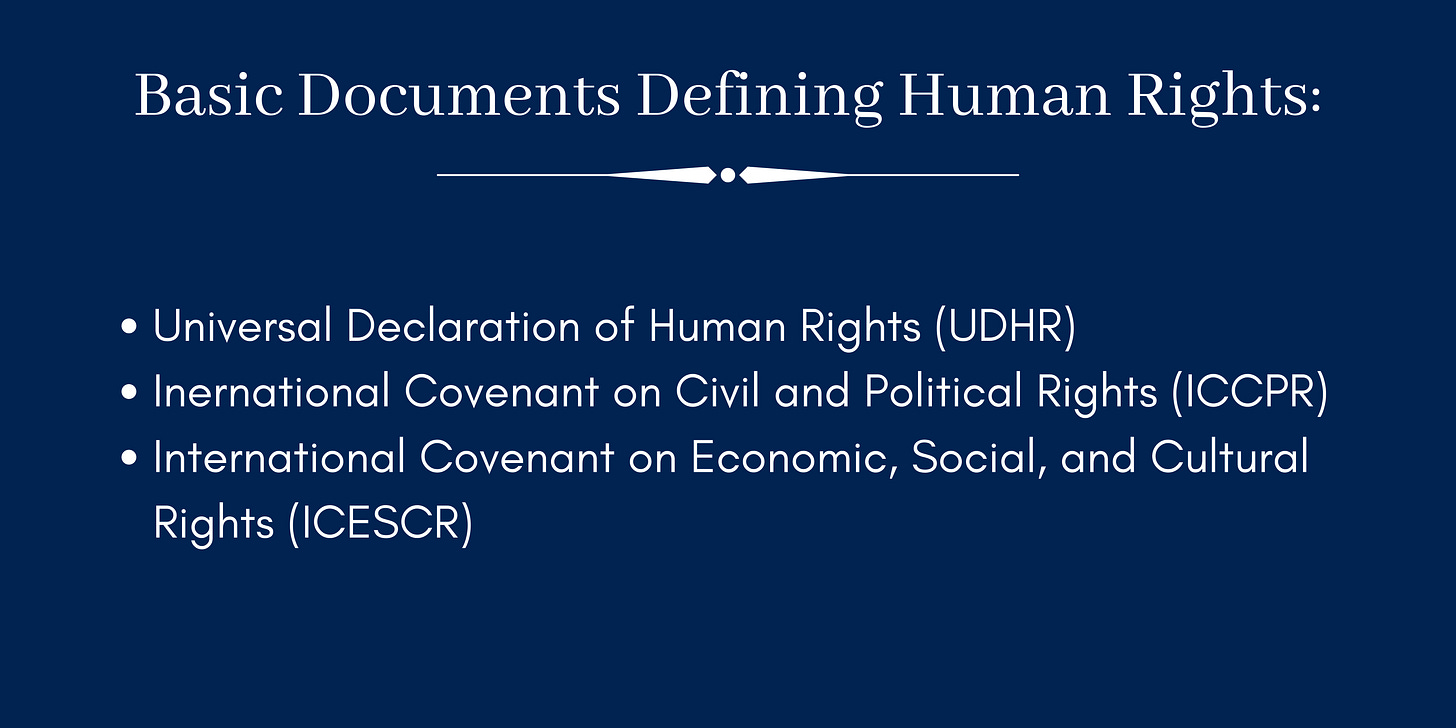What Exactly Are Human Rights?
And how do I know when mine have been violated? (analysis/commentary)
The concept of human rights may be crystal clear to some, and perhaps murky to others. Just because a group of people perceive that something is a ‘right,’ does that really make it a human right? How do we actually know what human rights are? Perhaps more importantly, how do we know when they have been violated and what can even be done about it?
Human Rights: The Origin Story
First, I will begin with a brief overview of the origins of human rights. Prior to World War II, there were no real precedents which established the concept of human rights on the international stage.
After World War II, Nazi leaders, soldiers, and the doctors who conducted horrific medical experiments were put on trial on the international stage. These trials are named the Nuremberg Trials, and represented the first time individuals were held responsible for crimes against humanity. Previously, entire countries had to bear the burden of responsibility for these kinds of crimes. Nuremberg showed that no longer was “just following orders” a defense, but that all individuals had to answer for their own crimes.
Following the Nuremberg Trials, the necessity of establishing human rights became clear to the international community. This necessity resulted in the Nuremberg Code which established a baseline for medical ethics and humane treatment. Thus was borne the official international recognization of human rights.
What Are Human Rights?
Human rights today are defined by the United Nations’ Universal Declaration of Human Rights (UDHR). This document was created in 1948 following the tragedies of World War II in order to establish internationally recognized basic standards of human rights that should be protected. Essentially, it is an international bill of rights. What made this document unique is that it was created with input from representatives around the world and allowed different cultural perspectives to participate, even those that were not necessarily democracies. It combined perspectives of the Western block, as well as perspectives from the Eastern block.
In 1976 following the UDHR, came the International Covenant on Civil and Political Rights (ICCPR) and the International Covenant on Economic, Social, and Cultural Rights (ICESCR).
Though there are countless other treaties and documents that have followed which expand on these basic ideas, these documents define the modern understanding of human rights.
Is There Any Recourse For Victims Of Human Rights Abuses? What Can Be Done?
The International Criminal Court (ICC) is the international institution that is responsible for trying international criminals. The jurisdiction of this court only falls within four categories which include genocide, crimes against humanity, war crimes, and crimes of aggression (meaning states[countries] attacking other states with no provocation.) This link explains further about the ICC and the trial process.
How Do I Know When Human Rights Have Been Violated?
In order for international crimes in the form of human rights violations to have been committed, the acts must include certain elements. This document lays out a thorough summary of crimes the ICC handles, and what elements make up those crimes.
Examples From ICC Document Above:
Article 6 (c)
Genocide by deliberately inflicting conditions of life calculated to bring about physical destructionElements
The perpetrator inflicted certain conditions of life upon one or more persons.
Such person or persons belonged to a particular national, ethnical, racial or religious group.
The perpetrator intended to destroy, in whole or in part, that national, ethnical, racial or religious group, as such.
The conditions of life were calculated to bring about the physical destruction of that group, in whole or in part. [4]
The conduct took place in the context of a manifest pattern of similar conduct directed against that group or was conduct that could itself effect such destruction.
[4] The term “conditions of life” may include, but is not necessarily restricted to, deliberate deprivation of resources indispensable for survival, such as food or medical services, or systematic expulsion from homes.
Article 7 (1) (k)
Crime against humanity of other inhumane actsElements
The perpetrator inflicted great suffering, or serious injury to body or to mental or physical health, by means of an inhumane act.
Such act was of a character similar to any other act referred to in article 7, paragraph 1, of the Statute. [30]
The perpetrator was aware of the factual circumstances that established the character of the act.
The conduct was committed as part of a widespread or systematic attack directed against a civilian population.
The perpetrator knew that the conduct was part of or intended the conduct to be part of a widespread or systematic attack directed against a civilian population.
[30] It is understood that “character” refers to the nature and gravity of the act.
Why Is It Important To Know About Human Rights?
It is crucial to understand human rights so that when we see abuses occurring, perhaps even in our own country, we will be able to speak out for our countrymen and neighbors. I encourage you to look through the various resources linked above and learn more about human rights and international crimes. Knowledge is true power against those who seek to pervert the truth.



